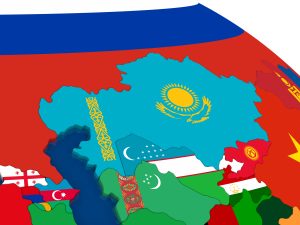A day after former Russian President Dmitry Medvedev posted an unhinged (and since deleted) rant to Vkontakte directly questioning Kazakhstan’s sovereignty, a judge in the northern Kazakhstani city of Petropavl gave a briefing on a months-old case: A couple convicted in May of making separatist statements in the Chatroulette app last December.
According to RFE/RL’s Kazakh Service, Radio Azattyk, the Petropavl City Court issued its verdict on May 30, 2022, but the case had not been reported on previously. The couple, who had not been identified beyond their ages (a 43-year-old woman and a 49-year-old man), allegedly “openly expressed… socially dangerous statements that entail political and social risks in terms of maintaining the unity of the Republic of Kazakhstan” to another person on Chatroulette.
Sputnik Kazakhstan, part of the Russian state-funded Sputnik, reported that the the couple had called for northern Kazakhstan to be annexed to Russia.
Chatroulette pairs random users for video chats. It’s not clear who the couple was matched with and why that individual recorded the conversation.
On August 3, Judge Almas Zhumagazin briefed reporters that the couple’s appeal had been denied in June and their sentence of five years upheld. His comments made clear that the timing was no coincidence.
“Any state fights against three types of evil: extremism, separatism, and terrorism,” the judge said, echoing a Chinese formulation disseminated throughout Central Asia over the last decade warning of the “three evils.” The judge went on to comment that “Going online, every citizen must understand that it is public, that he can be recorded, that he can be published.”
The couple were charged under Part 2 of Article 180 of the Kazakh Criminal Code, which addresses “propaganda or public calls for violation of the unitarity [sic] and integrity of the Republic of Kazakhstan, inviolability and inalienability of its territory or disintegration of the state… with the use of mass media or using telecommunications networks” and carries a minimum five-year prison sentence.
Kazakhstan takes separatism particularly seriously, over the years jailing individuals for making comments on social media viewed as either derogatory toward the Kazakh state or advocating separatism. Petropavl, in particular, is an epicenter of such cases given its large ethnic Russian population, its proximity to the Kazakh-Russian border, and the resulting close social and economic ties to Russia in the city. In 2016, for example, a 37-year old Kazakh citizen was sentenced to five-and-a-half years in prison after being convicted of separatist activities and inciting discord online. The man had posted negative comments about Kazakhs and Kazakhstan as well as calls to make Kazakhstan part of Russia on his Vkontakte account between September 2014 and May 2015.
The Russian invasion of Ukraine has certainly exacerbated concerns in Kazakhstan, about which Russian commentators and politicians over the years have made dismissive comments.
Kazakhstan has walked a fine line since February, balancing its close political and economic relationship with Moscow with its need to define and defend its own sovereignty. In June, Kazakh President Kassym-Jomart Tokayev said during a panel with Russian President Vladimir Putin at the 25th St. Petersburg International Economic Forum (SPIEF) that Nur-Sultan did not recognize quasi-states. Kazakhstan, he said, does not recognize Taiwan, Kosovo, South Ossetia, and Abkhazia or, in that same vein, Luhansk and Donetsk — two regions in Ukraine that Russia has occupied and recognized as independent. In positioning this policy as broadly applied, Kazakhstan is making an effort to not insult close partners with which it disagrees on this point in practice.

































